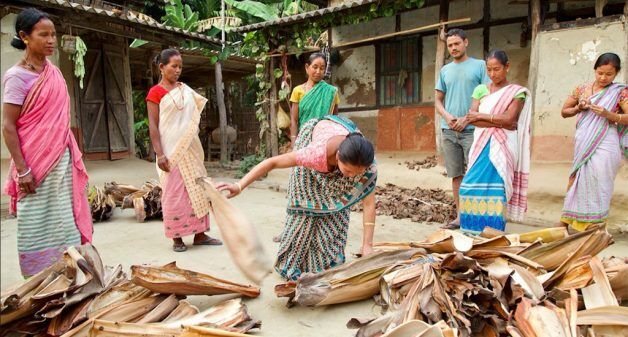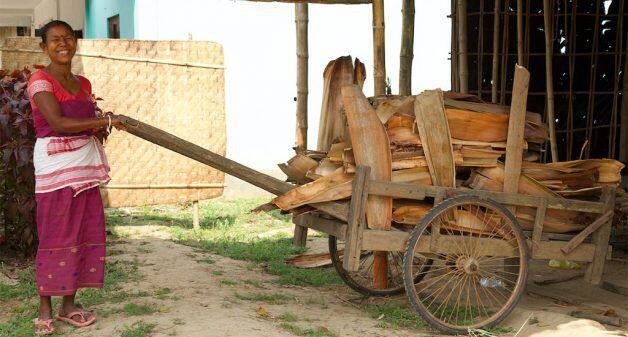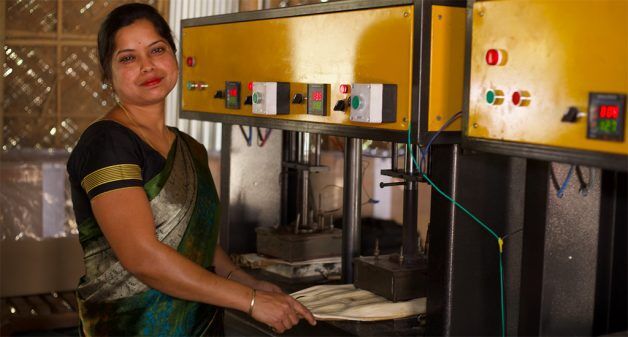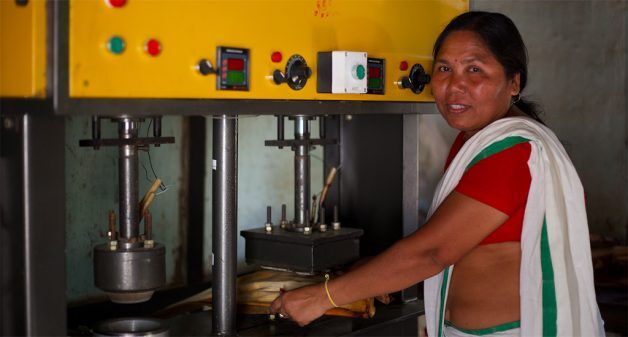
Sustaining a social enterprise during lockdown
A company that makes eco-friendly tableware by roping in marginalised tribal women, uses different funding approaches to sustain their livelihood through the lockdown.

A company that makes eco-friendly tableware by roping in marginalised tribal women, uses different funding approaches to sustain their livelihood through the lockdown.
The COVID-19 lockdowns and discontinuities were hard for everyone. For some of us, the loss was merely in terms of very disturbed work pattern and the boredom of staying at home. For a large number of people it involved loss of work, loss of income and sufferings on that account.
And for the good souls who were working to increase the income of the poor people, it was a double whammy: not only did their clients suffer, but they themselves personally also lost their own income. Here is how some of them coped.
Tamul Plates Marketing Private Limited (TPMPL) is a social enterprise based in Barpeta in Assam. It anchors and encourages the use of sheaths from areca nut trees to make disposable dinner and snack plates and bowls for the benefit of people who wish to contribute to environmental sustainability while yet providing an enjoyable eating experience.
TPMPL has worked in a very atypical social enterprise format: it is registered as a for-profit company, but it works primarily to enable poor Bodo, Rabha and other tribal families expand their income by using a resource which had no competing use till date.
TPMPL has evolved two distinct models of working. In the first model, the Bodo tribals collect tamul patta (areca nut sheath shed by the areca nut trees), clean and store them to hand them to the company’s central manufacturing facility.

In the second model, 30 women trained well by them not only organise collection of these sheaths in their surrounding area but also make high quality dinnerware on machines individually arranged for them by the company.
There also are several other women, not necessarily in a cluster, trained to make plates for them. The core operations of the upstream activities are that the company picks up the dinnerware, whether from its own manufacturing facility or from these women, assesses the quality, packs and markets them. (READ: How eco-friendly Tamul Plates bring change in women’s lives)
Working through challenges
TPMPL had worked hard to win export markets in Australia as well as in Western countries in addition to the hotel-restaurant-catering (HORECA) segment within the country.
All was progressing well till 2019. In that year, TPMPL set its eyes on an expanded business horizon. To seed the market, they sourced finished goods from south India, rebranded and exported them, incurring a loss in the process. An angel investor had agreed to invest Rs 2.5 crore in TPMPL’s expansion facility and the deal was about to be signed when COVID-19 hit and the country went into lockdown in late March 2020.
Not only did the angel investment get stuck, TPMPL faced a huge problem because of the lockdown. As a social enterprise, it was committed to ensuring that neither the poor Bodo tamul sheath collectors nor the employees or the women in the decentralised manufacturing unit suffered. Or rather, their loss was kept at the minimum considering the huge trauma of the lockdown and stoppage of all business for over six weeks.

Not a single employee was let go. TPMPL told the collectors to keep collecting tamul patta and the decentralised women producers to keep producing. The company built large stocks of finished products till their warehouse was overflowing with finished products and so were the residential spaces of the top management!
Multi-pronged financial management
But, already in a little financial hole due to the operations in 2019 and with complete stoppage of business, their own cashflows were hopelessly inadequate to meet these lofty goals. So how did they manage?
The first thing they did was that three persons in the top management stopped drawing salaries. They managed to run their households by scouting for and performing such assignments in the development sector as could be obtained.
They mobilised money through retail funding route using Ketto, a crowd-funding platform, and collected nearly Rs 25 lakhs from small donors. They also persuaded the Australian buyer to give them an enhanced advance payment to help the poor tribal women. The buyer agreed, considering both the past excellent experience with TPMPL and the seriousness of the setback to poor producers.
And TPMPL persuaded Dhriiti, its parent body, to share some of the grants received by them as no-interest loans. TPMPL also received timely financial support from Upaya Social Ventures, a socially conscious US-based investor, who gave the company a low interest loan which had to be paid in a manner calibrated to TPMPL’s revenue when the economy opened.
Keeping the company afloat
Once the lockdown was lifted in May and the economy started limping back to normalcy, TPMPL team discovered that they could liquidate some of those inventories and clear their dues. They ended the fiscal 2020-21 with a turnover not much lower than the previous year but with a small book profit due to non-payment of salaries to the management.

They also discovered that many customers of the HORECA industry had encountered customer suspicion regarding safety of re-used dinnerware in the COVID-19 context, and became very receptive to the use of tamul plates in their services.
Just as business started looking up and the management thought that they could start drawing their salaries again, the second wave hit in April 2021. They were again hard pressed. As ill luck would have it, personnel in the management team suffered personal tragedies, losing family members during the second wave and hence a significant time away from work.
They were already without salaries for a year and had exhausted all their reserves for running their households. Their keen desire to continue operations faced a serious personal challenge. The team had to be viable as individuals and households if the company were to be managed.
They managed by delegating as much work as they could to the trained staff, providing only critical services to the company and managing some work that would help them keep their bodies and souls together.
The management has persevered so far and good people and Samaritan souls have helped them. As the clichéd expression goes, where there is will, there is a way. If you do take pains and make sacrifices in order to protect incomes of poor families whose livelihoods you have set out to enhance, there will be good people to help you. But there is a struggle and as the expression goes, if you are a good cook, you will stay in the kitchen howsoever hot the kitchen becomes.
Sanjiv Phansalkar is the director of VikasAnvesh Foundation, Pune. He was earlier a faculty member at the Institute of Rural Management Anand (IRMA). Phansalkar is a fellow of the Indian Institute of Management (IIM) Ahmedabad.